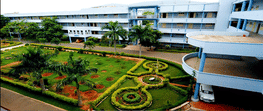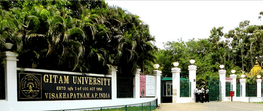Dr. B. Murali Krishna is the Principal at Avanhti Institute of Engineering and Technology. He pursued Ph.D. from the Department of Mechanical Engineering, Indian Institute of Technology Madras, Chennai, in the year 2010. He has around 23 years of work experience in Teaching, Research, and Administration with 13 years of experience as Professor and Principal. He has published 94 research papers in national and international journals. He has attended a total of 13 workshops.

You have held key positions at education institutes throughout your professional career. What are the key factors that keep you connected with the education sector?
The key factor is what kind of quality intake is entering into the campus. You need to identify the gaps or lack of the student’s intake. Accordingly, from the first year to the end, you need to groom the student to meet the outcome-based education and the industry’s requirements. Since all the students will not have the same unique quality, in the beginning, we start do, identification of the student quality and the gaps so that we can fill them.
Being the principal of Avanti Institute of Engineering and Technology College, what is your philosophy of leadership? How would you describe your leadership styles?
Fine, good question. As an administrator, any principal does things but, as my policy judge general I would not be like a boss, I would be like a leader so that I can make a team and encourage my students.
Being the principal of Avanti Institute of Engineering and Technology, how do you strategize about the key programs and plans for the marketing and administration of your college?
As specifically I said to meet the demands or requirements of the industry right from once they reach itself, right, so we need to identify the curriculum gaps as well as the industry requirement reference so that we start to add on certification courses that are a part of the JNTU curriculum. We add courses like NPTL which are delivered by the IITs. This is called NPTL etc. So, we are giving the expected source from the premier Institute to our students. So, in addition to that, we add course certification courses so that students will be packed by the time of relief. In turn, it meets the requirements of the market as well as the industry.
Check Avanthi Institute of Engineering and Technology Placement
The education system in India and other foreign countries are structured very differently. In your experience, what can an inbound student gain from studying here in your institute?
What you call the gap is there as foreign universities generally follow what you call the ABEC system which is completely outcome-based. Our students particularly in India and in our region, study the subjects or test books or knowledge in a wider broader way. Whereas in the foreign education system, they do inside or in the depth of particular do that so that uniqueness or identification will be there in foreign students, our student will have a broad and what to call wide knowledge or information will be there. So, referring to that we need to integrate both broadness and inside to in deep inside knowledge is required for that only I said know some of the courses we need to add to meet that right.
How does the curriculum of Avanti Institute of Engineering and Technology ensure the best practice of industry?
Fine, so as we are affiliated with JNTU University, I mean Burja or Vizianagaram, strictly, we need to follow the syllabus or core structure given by the university. Again, I am underlining apart from the JNTU curriculum. Where and when required from first year to final year, we Add all advanced and industry requirement training programs, internships, industry tools, workshops, and even for faculty development also we do. So that update with the advances so that we use it to do.
Any insights into how your university could be more welcoming to students of different races or economic backgrounds?
So, the university is different from the economic background you said. Not only university, but our state government policy itself encourages students, particularly poor students to get a degree knowledge industry. There is a scheme called the reimbursement scheme. So those who know with good rank etcetera and with lower income of roughly it is less than 2,00,000. The government itself encouraging it is a policy of the government. So that university as well as we encourage what you call economically weak students with what you call the jail or aspiration of doing engineering, which is encouragement is there along with them. Apart from that, the government and university, we also from our management itself encourages the poor student, poor and male student by giving scholarships and rewards.
What do you think your roles and responsibilities towards the universities and the students are?
Yeah, good question, you have asked more or less it is a map so-called till this time what you did and what and all plans are there with you like it is a map right? Till now our institution is very few institutions have permanent affiliation with the JNTU we are one among a few colleges we are one having permanent affiliation and our institution is accreted with the B plus NAAC a grid right and the majority of our faculty or university ratified and we are at to get up what to call UGC to you have told me and we have more than 30 MOMs with academic and industry collaborations are there even we encourage the research and consultants also from the for the students as well as the so-called professor as you said that objective or next steps or route may for that immediately. Now we are in the process of NAAC upgrading to get a plus or a plus that is we are on that seriously we are working on that to do that that is the immediate thing next to that couple of months only we are planning for autonomous institution to make it as an autonomous and the long-term object with that certainly to be a deemed university. These are all our targets in our route NAAC.

![Avanthi Institute of Engineering and Technology - [AIET]](https://image-static.collegedunia.com/public/college_data/images/logos/1494583966logoedt.jpg?h=71.7&w=71.7&mode=stretch)








![Indian Institute of Petroleum and Energy - [IIPE]](https://image-static.collegedunia.com/public/college_data/images/appImage/16002398760336.jpg?h=111.44&w=263&mode=stretch)





![Anil Neerukonda Institute of Technology & Sciences - [ANITS]](https://image-static.collegedunia.com/public/college_data/images/appImage/1591266477Cover.jpg?h=111.44&w=263&mode=stretch)



![Vignan's Institute of Information Technology - [VIIT]](https://image-static.collegedunia.com/public/college_data/images/appImage/19177_5.jpg?h=111.44&w=263&mode=stretch)

















.jpeg?h=72&w=72&mode=stretch)
.png?h=72&w=72&mode=stretch)

 (2).jpeg?h=72&w=72&mode=stretch)
.png?h=72&w=72&mode=stretch)
.jpeg?h=72&w=72&mode=stretch)
![Avanthi Institute of Engineering & Technology - [AIET]](https://image-static.collegedunia.com/public/college_data/images/logos/1495439551logo.png?h=72&w=72&mode=stretch)
![Raghu Institute of Technology - [RIT]](https://image-static.collegedunia.com/public/college_data/images/logos/1479541776RIT.jpg?h=72&w=72&mode=stretch)
![Maharaj Vijayaram Gajapathi Raj College of Engineering - [MVGRCE]](https://image-static.collegedunia.com/public/college_data/images/logos/1594279151Logo.jpg?h=72&w=72&mode=stretch)

![Raghu Engineering College - [REC]](https://image-static.collegedunia.com/public/college_data/images/logos/1480399520newnew logo.jpg?h=72&w=72&mode=stretch)
![BABA Institute of Technology and Sciences - [BITS-VIZAG]](https://image-static.collegedunia.com/public/college_data/images/logos/1512552765BITSLogo.png?h=72&w=72&mode=stretch)
![Vignan's Institute of Information Technology - [VIIT]](https://image-static.collegedunia.com/public/college_data/images/logos/148007135655.jpg?h=72&w=72&mode=stretch)
![NS Raju Institute of Technology - [NSRIT]](https://image-static.collegedunia.com/public/college_data/images/logos/1477459241Nsritlogo.jpg?h=72&w=72&mode=stretch)
![Anil Neerukonda Institute of Technology & Sciences - [ANITS]](https://image-static.collegedunia.com/public/college_data/images/logos/1591266477Logo.jpg?h=72&w=72&mode=stretch)
![Chaitanya Engineering College - [CEC]](https://image-static.collegedunia.com/public/college_data/images/logos/1698812224download13.jpg?h=72&w=72&mode=stretch)
![Visakha Institute of Engineering & Technology - [VIET]](https://image-static.collegedunia.com/public/college_data/images/logos/1480073329logo.jpg?h=72&w=72&mode=stretch)

![Dadi Institute of Engineering and Technology (Autonomous) - [DIET]](https://image-static.collegedunia.com/public/college_data/images/logos/166270155513.DIETLogo.png?h=72&w=72&mode=stretch)
![Gonna Institute of Information Technology and Sciences - [GIITS]](https://image-static.collegedunia.com/public/college_data/images/logos/1479810323logo.jpg?h=72&w=72&mode=stretch)



Comments